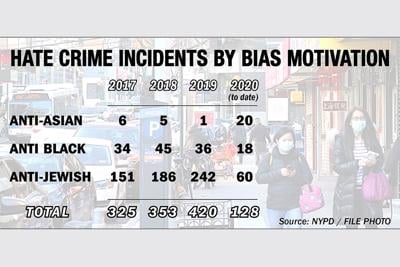
In response to a major uptick in anti-Asian sentiment during the pandemic, the House of Representatives passed a resolution sponsored by Rep. Grace Meng (D-Flushing) to denounce racism by a vote of 243-164 on Sept. 17.
“Since the beginning of the coronavirus pandemic, Asian Americans have been forced to endure demeaning and disgusting acts of bigotry and hate, consisting of everything from verbal assaults to physical attacks,” Meng said in a statement following the passage of her resolution.
Meng had introduced the measure in late March, just before first-quarter hate crime statistics revealed that the amount of reported anti-Asian hate crimes in the first three months of 2020 were nearly double the incidents of the last two years combined.
According to NYPD data, hate crimes motivated by anti-Asian sentiment jumped by 1,900 percent in the last year — there was only one reported anti-Asian incident during all of 2019 compared to 20 in the first half of 2020. Hate crimes against Asian Americans had been steadily decreasing throughout the last three years until the pandemic — in 2017, racially motivated incidents toward Asians only made up 2 percent of all hate crimes, and total reports dropped to five in 2018 and just one in 2019.
The anti-Asian incidents this year make up for 15.6 percent of all reported hate crimes thus far, making Asian Americans the third-most racially targeted group following black Americans and Jewish Americans — the latter remains the most overwhelmingly targeted group, with nearly half of all racially motivated crimes involving a Jewish victim.
According to Meng, there were 2,583 reports of anti-Asian incidents throughout 47 states across the country from March to May. More than 70 percent of the incidents involved verbal harassment, followed by shunning, or deliberate avoidance because of race, at nearly 22 percent and physical assault at nearly 9 percent.
Meng said that the increase was partly caused by the use of racially charged language by political leaders, such as President Trump, who has used the terms “Chinese virus,” “Wuhan virus” and “Kung-flu” when referring to COVID-19. In an effort to hold Trump and other officials accountable for the influence they may have lent to the increase in anti-Asian sentiment, the resolution calls for all public officials to condemn and denounce all anti-Asian rhetoric, as well as forms of intolerance against all ethnicities, races and religions.
Additionally, the resolution calls for federal, state and area law enforcement to work together to investigate and document all reports of bias crimes, incidents and threats against Asian Americans, especially due to the pandemic, and to hold the perpetrators accountable for the sake of recommitting the country as an inclusive and diverse society.
As a guest on MSNBC’s “The Week with Joshua Johnson,” Meng said that the resolution was meant to be an “easy way” for Democrats and Republicans to take a united front against bias. All the 164 negative votes on the resolution were Republican, and only 13 House Republicans voted in its favor.
The Senate version of the resolution is still pending in its chamber.
“It’s time for this hysteria and discrimination to end,” Meng said. “This measure is about condemning hate and violence and attacks on innocent individuals. We’re talking about people’s lives and their right to feel and be safe.”
